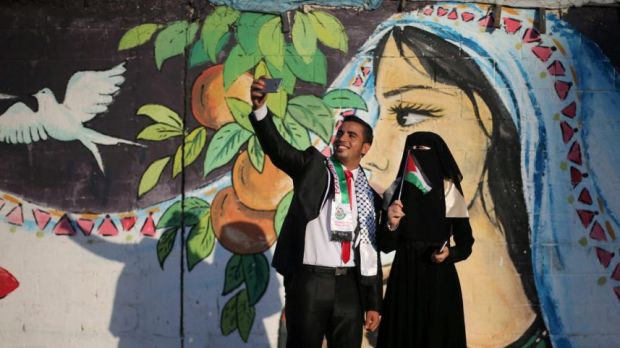
The besieged Gaza strip has a lot of hidden stories the media can’t properly access. Those stories are populated by individuals who won’t reveal their names and details to outsiders, out of pride, or privacy, or shame. Every story has its own shocking and surprising details. They need to be told so a wider audience can begin to understand, just a bit more tangibly and personally, what it means to live in the enclave.
In Gaza, we also fall in love.
Sometimes we fall in love with a cousin, a friend or even a student.
She was just 17 years old when she came to the educational center where I was volunteering as an English teacher. The head teacher asked her mother to choose the teacher who would instruct her daughter. But her daughter intervened. She pointed directly at me. I knew that would be the beginning of a love story.
Over the next eight months, she and I finally fell in love. Her family knew, but mine did not, because I knew my family was not financially ready for a marriage. Immediately, I realized the mistake I had committed by allowing such a deep attachment to grow.
I am my parents’ eldest son. They want me to marry so they can enjoy being grandparents, but they know that I don’t have a apartment to live in or a stable salary that would allow me, my wife and them to survive on. My father has been unemployed since 2005 when he, along with thousands of other Gazans, could no longer work inside Israel after its withdrawal. He became one of the 80% of all Gazans who depend on social assistance and international aid.
My girlfriend’s parents loved me so much that they said they could not live without me. “If you ever leave us, you will kill our souls,” her mom once told me. Her words made me cry for hours, because I already knew marrying her daughter would never happen.
I felt trapped between Scylla and Charybdis. I was afraid to be realistic and to tell her family that financial difficulties prevented me from marrying their daughter, and I was also scared to promise the girl and her family to wait for me, and for my situation to improve, because I did not want them to wait for years.
Between fear and hope, the relationship lasted for about two years, and she was almost 20 years old when her mother asked to meet me alone. I knew what her mother wanted to talk about. I met her in a restaurant in Gaza, popular with families, and she started talking about the social culture of Gaza and how people regard young women when they pass the age of 20.
In Gaza, and in most of the Arab world, families consider girls over 20 as irredeemable spinsters. That means many have no chance of marrying – for several reasons. There is a gender ‘surplus’ of young single women because so many young men immigrate to the West looking for jobs, because men disproportionately lose their lives in combat, and because men don’t have the financial means to get married.
“You know my daughter will soon be 20, and I still don’t know if you’re intending to marry her.” Her mother started her prepared speech. “You know we can wait for you for years, but your family should know and I need guarantees that you will indeed marry her!”
It was for her right to say that, and that day I felt the most guilty and oppressive person on earth. I realized how much her family was attached to me, and how much they needed me to be one of them. I couldn’t give my answer there and then. I asked her mother to give me a few days to think.
Gaza’s difficult financial conditions, including an unemployment crisis that exceeds 45%, one of the highest in the world, stifle the chances of hundreds of marriages ever taking place. That has led to the proliferation of organizations that facilitate weddings. Their main role is to help people who don’t have the financial means to marry. Because every wedding in the Gaza Strip costs at least $8000, these organizations provide grooms opportunities to pay in comfortable installments over two or three years.
I thought of going to register at one of these organizations, but I was very hesitant. I knew that everyone in the neighborhood would know I married through them, and that it’s considered shameful. I didn’t want anyone to talk badly about me. Moreover, I would not be able to pay the installments back, so I would fall in a dangerous financial trap; I would likely default, and I might even go to jail. So I eradicated the idea of marriage from my mind.
I called her mother, and told her that I would not let her daughter or her wait for me. I would not be able to marry for years. She cried over the phone several times, but I still felt I did the right thing.
That was two years ago. Until now my ex-girlfriend has refused every marriage proposal suggested to her. Her mom once called me and said that her daughter was suffering psychological difficulties. That day, I understood what living in the Gaza Strip means.
Mohammed Arafat
27-09-2017